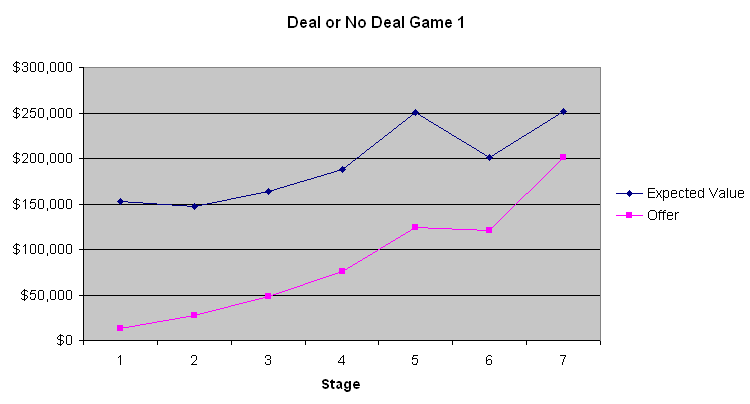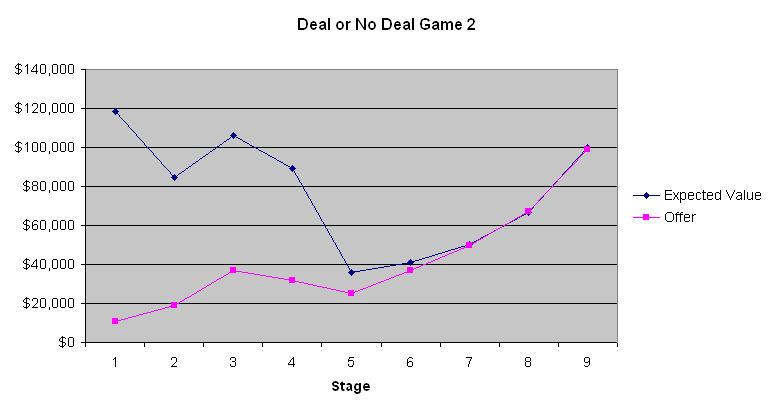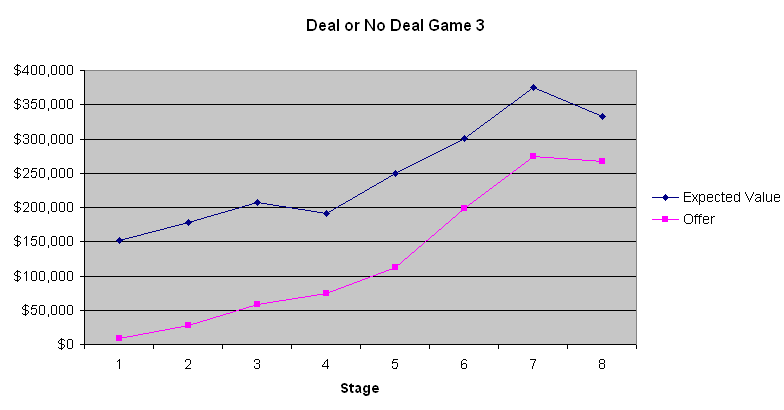Ask The Wizard #150
My question is regarding the game show, Deal or No Deal, very popular in Australia and about to come to England. The contestant is shown twenty-six numbered briefcases, each containing a hidden amount of money, ranging from 50 cents to $200,000 as below.
- $0.50
- $1
- $2
- $5
- $10
- $25
- $50
- $75
- $100
- $150
- $250
- $500
- $750
- $1,000
- $1,500
- $2,000
- $3,000
- $5,000
- $7,500
- $10,000
- $15,000
- $30,000
- $50,000
- $75,000
- $100,000
- $200,000
The contestant selects one of the briefcases to be THEIR suitcase. Through a process of elimination, by opening the other suitcases, they try and work out how much money is their case, or whether it would be wiser to take a "Bank offer". The Bank Offers are based on, but not equivalent to, the arithmetic mean of the remaining briefcases. So, if there are mainly large valued briefcases remaining, there is a high chance that the contestant’s briefcase is valuable, and so the Bank Offer will be generous. Conversely, if the player has been less fortunate and opened the more valuable briefcases, then the Bank Offer will be low. What would be the best strategy to employ if you were a contestant on this game? A non-mathematical gut instinct strategy would be ignore the Bank offers and carry on opening cases until either the $200,000 was opened and eliminated, or both the $100,000 and $75,000 were opened and eliminated. What’s the math behind this game, Wizard?
Deal or No Deal just started here in the U.S.. The rules sound the same except our prizes go up to a million dollars as follows.
- 0.01
- 1
- 5
- 10
- 25
- 50
- 75
- 100
- 200
- 300
- 400
- 500
- 750
- 1000
- 5000
- 10000
- 25000
- 50000
- 75000
- 100000
- 200000
- 300000
- 400000
- 500000
- 750000
- 1000000
Here is the flow of the game:
- Player picks one case for himself
- Player opens up six of the remaining 25 cases.
- Banker makes an offer.
- If player declines he opens five more of the 19 remaining cases.
- Banker makes an offer.
- If player declines he opens four more of the 14 remaining cases.
- Banker makes an offer.
- If player declines he opens three more of the 10 remaining cases.
- Banker makes an offer.
- If player declines he opens two more of the 7 remaining cases.
- Banker makes an offer.
- If player declines he opens one more of the remaining cases.
- Keep repeating steps 11 and 12 until player accepts an offer or player has the last unopened case.
The following chart plots the player’s expected value and the banker’s offer.



The most obvious thing to be learned from these three charts are that the first four to six bank offers are terrible deals. The average suitcase has $131,477.54 before any are opened. To only offer $9000 to $13000 the first stage is a deal only a fool would make. However gradually the offers get better. Game 2 shows us the expected values were almost the same as the banker offers towards the end of the game when the player’s expected value was fairly low. However in games 1 and 3 when the expected values were higher the banker apparently was trying to take advantage of the risk averse nature of most people when large amounts are involved. I don’t know if it mattered but the contestant in game 2 appeared to be a gambler who wanted to win big. Based on comments by the host, who communicates to the banker by phone, the banker does appear to take the contestants words and actions into consideration. If I were in the banker’s shoes I would act much the same.
If the player is neither risk averse nor risk prone, and also ignoring tax implications, the player should keep refusing banker offers until one exceeds the average of the remaining suitcases. For most people the progressive nature of the income tax code favors taking a deal. As I have said before I would roughly say the value of money is proportional to the log of the amount. So the more wealth you have going into the game the more inclined you should be to gamble and refuse the banker offers. With such large amounts involved, no strategy will fit everybody. However I can fairly confidently say that the player should refuse the first four to six offers and then take the offers on a case by case basis (pun intended).
Links:
You can watch Deal or No Deal at NBC.com.
Archive of past shows.
Should I use your basic strategy exceptions after splitting?
That is a good question. Personally I eyeball the borderline plays based on what has already been played, especially on the second hand to be played. If forced I would say using the exceptions is better than the basic strategy only. However the way the basic strategy exceptions were created was on the initial hand only, so they are not entirely accurate for splitting, because the deck composition will be a little different.
I have been with my boyfriend for about 8 months now. We have been through a lot. Some people don’t even want us to be together. A couple of months into the relationship, he told me that he lied to me in the beginning of our relationship because he was trying to impress me. Now he lives with this woman. People are telling me that they are messing around. I broke up with him, but he swears that they are not messing around and that I never even gave him a chance to say anything. I don’t know who I should believe, DO YOU?
Believe your friends. Often love can cloud one’s judgement, while your friends can see more clearly see what is going on and can give good advice. Lying is also a big strike against this guy. Move on with your life.
Dear Wizard, you go to great lengths to explain the odds and why they are always in the casino’s favor. This being the case, why would anyone gamble?
Because it is so much fun!
A popular option in Blackjack type games here in Washington State is called "Double Down Rescue." If you double down, and don’t like your double down card you may surrender your double down portion, but receive your original bet back. As I understand your BJ Appendix 9, you should take this option if your double down results in a 0-16 versus a dealer 8 through Ace; since your expected loss by standing is greater than your -0.5 loss by rescuing? Fantastic site BTW. It should be required reading for any gambler.
Thanks for the kind words. You are right, if the expected value is less than -1 then you should opt to take the double down surrender. As you said if the expected value for standing in my blackjack appendix 9 is less than -0.5 you should surrender, because you are betting two units. I would only add to your strategy that if the dealer hits a soft 17 then you should also surrender 17 against an ace.
You have made it known that you use card counting in casinos. Why do casinos let you still play in their casinos?
I was recognized in Reno when counting once, although it may have been by dealer who knew me personally and tattled. It is a long and bizarre story. Aside from that I don’t play often, nor for high stakes, so the threat I pose is fairly small and not worth the fuss of memorizing another face.
I have been a dealer for 27 years and have seen a lot. One of my favorites was a guy who never looked at his cards playing blackjack....just tucked them. I thought he was nuts of course but some days he won and some days he lost. Just like most people. I tried this myself on a free gambling website and won 2 out of 3 times gambling 20 minute sessions. My question is this: How much worse off are you doing this than trying to play basic strategy? I really don’t think it matters much at all what you do in blackjack for the ’average’ player.
Under typical Vegas rules (6-deck, dealer hits soft 17) the house edge by always standing is 15.7%. In the short-run one could still overcome that, but in the long run you’ll lose badly.
My boyfriend broke up with me over a year ago for about 8 months, and then we got back together. Everything was fine for the first 4 months, then I started to become resentful of the time he broke up with me because he really hurt me. He is someone who is mainly friends with the opposite sex because he’s such a nice guy. He also loves a lot of attention, and I tend to be a jealous person. It seems he is constantly trying to impress other girls and doesn’t really like to acknowledge the fact that he has a girlfriend. As someone who is insecure, this seems like a very bad match. I’ve tried to tell him that our relationship is unhealthy, but he won’t hear it. What should I do?
You can’t fault him for being a nice guy. What I think is unhealthy is your jealousy.Unless don’t stop trying to keep him on a short leash I think a second breakup is inevitable.
Great site keep up the excellent work. I am looking for a game/games that are suitable to get up one unit. i.e. If i bet 10 dollars I would like my original 10 back plus the 10 I bet. I belives the craps pass line would be the best bet to do this. I dont mind going down a little money if I have to, but I would expect to get positive at least the amount of my original bet sometime before the end of the shoe or game. Is craps the answer...or is there a card game that may be better? Thanks for your time and effort.
Thanks. If your goal is to win just one unit I agree craps is the best place to start. The don’t pass is slightly better than the pass. However if you lose your first bet I would switch to blackjack. Only when exactly where you started would I go back to craps. This is because you won’t need to double or split to win just one unit, and a hit/stand only blackjack game has a house edge of about 2.5%.


